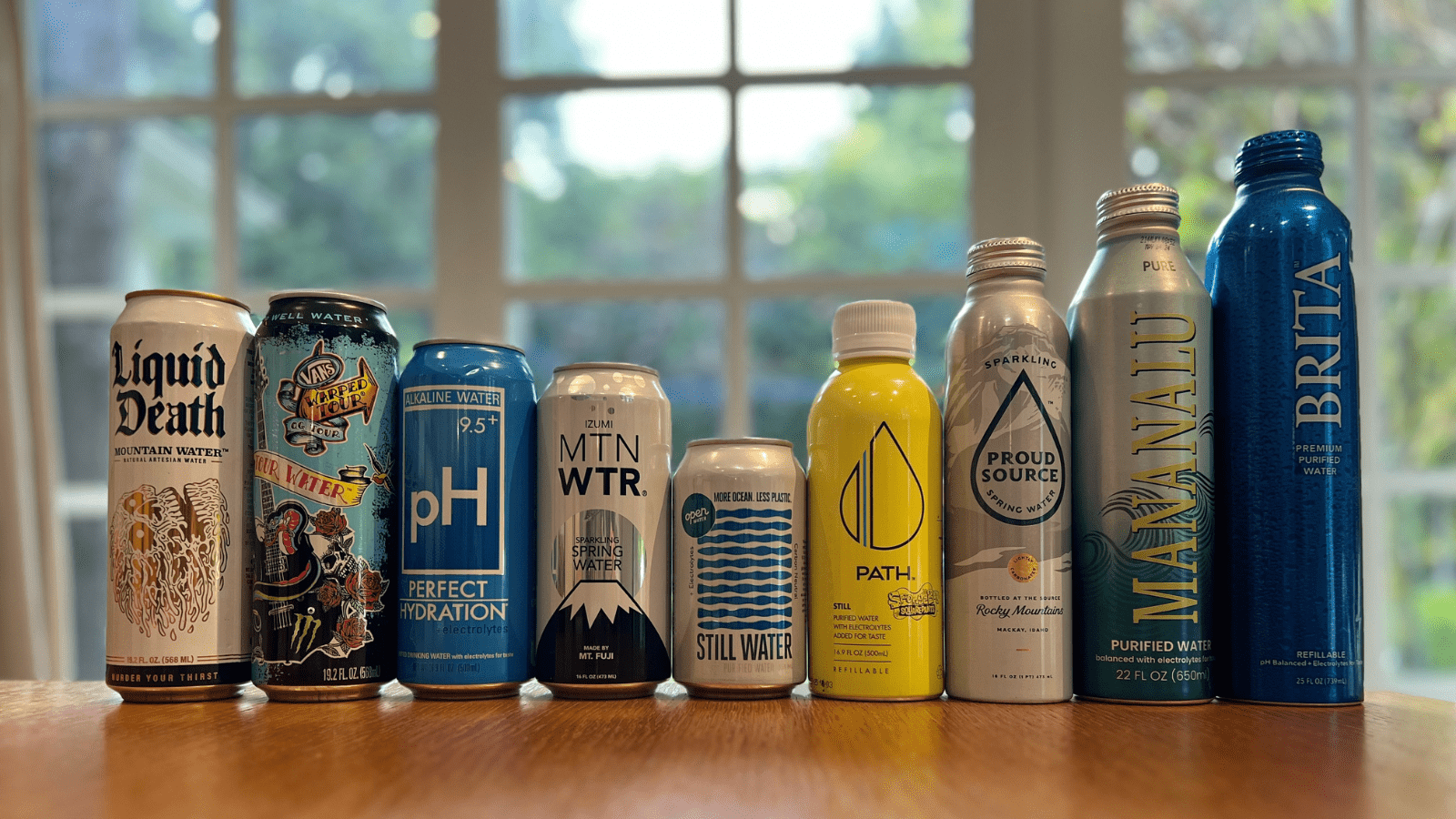As the world becomes more conscious about environmental sustainability, plastic in packaging has come under much scrutiny. One of the most significant contributors to our plastic pollution problem is single-use plastics. One solution to this problem is canned water, which many environmentally conscious companies see as an eco-friendly alternative to bottled water, with the hopes that it will reduce waste and lower our carbon footprint. But is canned water better for the environment?
Let’s explore.
Why Canned Water Outperforms Bottled Water
Here are a few excellent reasons to reconsider how we think about taking water on the go.

1 – People recycle aluminum more predictably than plastic
One of the most significant advantages of canned water is that it is fully recyclable. Also, we are already in the habit of recycling cans. With a recycling rate of over 75%, aluminum remains the most recycled beverage container on the planet. This is because aluminum has recyclable value while plastic doesn’t. Furthermore, aluminum can be recycled indefinitely, significantly reducing the environmental impact of producing new cans.
2 – Canned water is stackable
Another factor to consider is that canned water is lightweight and stackable, which makes it easier to transport and store. This significantly reduces the carbon footprint associated with shipping and delivery. Compared to bottled water, canned water is also more compact and efficient regarding space utilization. This makes it ideal for outdoor activities such as hiking or camping, where space is limited.
3 – Canned water creates less harm to the environment
Canned water also has fewer negative environmental effects during production than bottled water. Plastic bottles require more energy to produce, and this results in a higher amount of greenhouse gas emissions. Canned water production requires less energy, which makes it a more environmentally-friendly option. But perhaps the most excellent argument for using aluminum is the amount of time it takes for them to biodegrade. While plastic bottles can take up to a thousand years to biodegrade, aluminum cans take only a fraction of this time.
4 – The cans come from recycled aluminum, a more sustainable material
Not only are the water cans easy to recycle, but they also come from recycled materials. The United States Environmental Protection Agency estimates that aluminum container comes from 68% recycled materials. On the other hand, plastic water bottles contain only 3% recycled materials. This adds to what the EPA labels a “circular economy,” which reduces usage, reimagines materials, and keeps still usable materials out of the nation’s waste stream.

Photo: Ellie Shoja
Is Canned Water the Way to Save the Planet? Jason Momoa Appears to Think So
With all the advantages of using aluminum over plastic, it is no wonder that so many new and existing companies are jumping on the bandwagon of offering consumers a canned water alternative. Some companies go beyond just selling water in cans and using their resources to clean up the plastics polluting our oceans. One such company is Jason Momoa’s venture Mananalu [mananalu.com], which provides still, sparkling, and flavored waters in reusable aluminum bottles.
At the recent Natural Products Expo West in Anaheim, California, I spoke with Lindsey Fischer, VP of business development at Mananalu, whose tagline is “Bottled water for planet lovers.”
According to Fischer, only 9 percent of all plastic water bottles are recycled. The rest end up in landfills and the ocean, causing mass-level pollution and poisoning sea and land life.
Mananalu is going beyond replacing single-use plastic bottles with aluminum. With the help of their partner, rePurpose Global, they are removing one plastic bottle from the ocean for every bottle of water sold. “One of our biggest problems in terms of plastic waste is water bottles,” Fischer said in our interview. “There’s billions of them. We have a big mess to clean up.”
But getting consumers to purchase canned water instead of single-use plastic bottles is challenging. For one thing, canned water tends to be slightly more expensive, for another, consumers don’t immediately associate aluminum cans with water. Some changes to consumer habits must happen for the shift to canned water to take off.
I was excited to see the number of companies offering resealable, sturdy aluminum bottles for reuse. This design choice, too, is intentional. Canned water companies often commit to more sustainable production and use of their products.
What Are Some of the Brands That Lead the Way?
Mananalu, Path, Proud Source, and Brita designed their aluminum bottles with reusability in mind. They even encourage consumers to refill them after they drink the original contents. Indeed, reusing is the best form of recycling. “We recommend refilling the bottle,” Fischer said when I asked her. “I have a bottle that I carry with me on every trip and refill at the airport once I’m through security. The bottle will last you a long time.”
When I asked what Mananalu’s vision for the future is, she replied, “To eliminate all single use plastics. That’s the vision, but it’s grandiose. So, really it’s to raise awareness and bring consciousness to the problem of plastic waste. It’s not really going to change until the big brands do their part. Those that are modeling in plastics need to follow the trends of the little brands. That’s what we’re hoping to do: Shake up the industry, get the consumers on board, get their votes, and start shifting consumer behavior until the big brands have to come on board.”

Final Thoughts on the Arrival of Canned Water in the Marketplace
Canned water is undoubtedly a step forward in terms of eco-friendliness. If enough of us buy into Fischer and Mananalu’s vision, we might be able to move the dial back on the plastic pollution of our beautiful planet. By choosing canned water instead of bottled water, you consciously reduce your carbon footprint and positively impact our oceans – one recyclable aluminum bottle at a time.




















